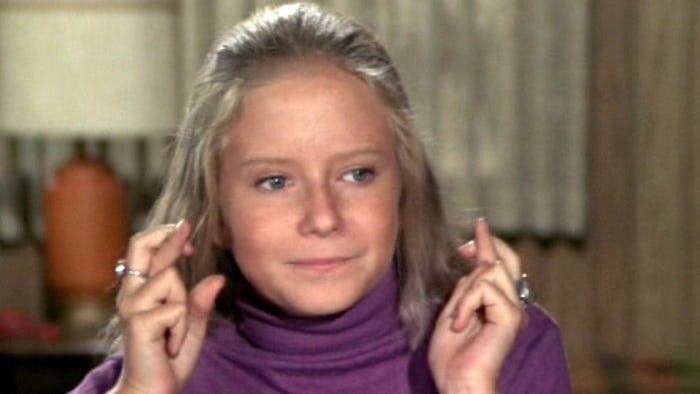Life

8 Ways Being The Middle Child *Actually* Affects You Later In Life
We've all heard stereotypes about middle children. Overlooked by parents and siblings alike, they suffer in silence or act out to get the attention they crave. We feel sorry for middle children, and this sympathy may turn patronizing. "Middle child syndrome" can even become a negative self-fulfilling prophecy. But how does birth order affect us in adulthood once we no longer live at home? Are there ways being the middle child actually affects you later in life? Experts say that while middle children may learn to be "accommodating" in childhood, they often grow up to lead unconventional and trailblazing lives.
Overall, there is plenty of positive evidence about the effects of birth order on middle children — perhaps even more so than negative predictions. This is good news for middle children who feel unfairly stereotyped. And if you're skeptical that birth order is any more influential on your life than astrology, there's a scientific study to support that argument, too. However, you may get the most satisfaction from sharing this article with your first and last-born siblings and friends. "Think you're superior?" you might say. "Well, here's proof that middle children have the upper hand with many facets of life, including social skills." Who's laughing now? (Jan Brady, obviously.)
1They Thrive In "Caring" & Network-Driven Careers.
According to British magazine Psychologies, middle children often find their professional niche in "retail, sales, fashion, advertising or the caring professions." Famous middle children in these fields include Stella McCartney, Michelle Pfeiffer, Jacqueline du Pré, Princess Diana, Cindy Crawford, Cate Blanchett, and Emily Brontë.
2They Are More Likely To Become A Revolutionary
"It’s later-borns who fought for equality, freedom of speech, freedom of worship and abolition of slavery," says Frank Sulloway, PhD and author of Born To Rebel: Birth Order, Family Dynamics and Creative Lives, in best health Magazine. Examples of world-changing middle children include Mother Teresa, Darwin, Gandhi, and John F. Kennedy.
3They're The Life Of The Party
"The middle child often feels left out and a sense of, 'Well, I'm not the oldest. I'm not the youngest. Who am I?'" says therapist Meri Wallace in Parents. According to the same article, "This sort of hierarchical floundering leads middle children to make their mark among their peers, since parental attention is usually devoted to the beloved firstborn or baby of the family." This may be a bummer in childhood, but once you're grown up and no longer living at home, a large circle of friends is an advantage in many areas of life. Strong social skills can help you advance in your career, find a mate, and ward off feelings of loneliness and isolation.
4They're Great At Keeping The Peace
Considering a career in diplomacy or hostage negotiation? "Because middle children are often stuck in the middle, quite literally, they tend to be great negotiators and compromisers," Psychologist Kevin Leman, author of The Birth Order Book and The First-Born Advantage, told The Huffington Post. Even if "peacekeeper" isn't in your official job title, these traits will serve you well in your personal and professional lives, whatever career you choose.
5They Have Better Oral Hygiene
Weird, but true. As a middle child, "Your risk of gum disease is 5 percent lower, probably because your immune system got an early workout from the germs your older brother or sister brought home and is better able to dispatch oral bacteria," reported Prevention. So take pride in your superior oral hygiene — this will definitely come in handy later in life when routine cleanings at the dentist can turn into expensive surgeries and periodontal work to correct chronic issues.
6They're More Likely To Take Risks
"Later-borns are willing to risk not just their companies but their health and safety," writes Jeffrey Kluger in The Sibling Effect. So while a first-born or only child might play it safe and stick to non-contact sports, middle children are more likely to stick their necks out, for better and for worse.
7They Take The Opposite Path
Want to predict what you'll be doing later in life as a middle sibling? Observe your big brother or sister's ambitions and then identify the opposite. According to Kluger, "Siblings who hope to stand out in a family often do so by observing what the older child does and then doing the opposite."
8On The Other Hand, Birth Order May Have No Lasting Effect
According to a 2015 study on "whether a person’s position among siblings has a lasting impact on that person’s life course," there is no statistical proof that birth order impacts personality traits beyond intelligence. So if your middle child status already makes you inclined to rebel and do the opposite, you'll appreciate the notion that you can't be boxed in by an accident of fate like when you arrived in the world.
Check out Romper's new video series, Romper's Doula Diaries:
Check out the entire Romper's Doula Diaries series and other videos on Facebook and the Bustle app across Apple TV, Roku, and Amazon Fire TV.